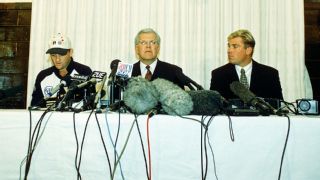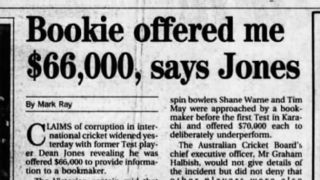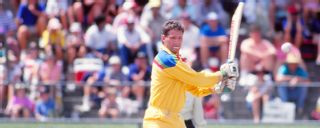|
In the aftermath of Dean Jones' awfully sudden loss, his pioneering tendencies have been well and truly covered. Jones, it has been said, revolutionised the game through his attention to the details of one-day matches and innings, and an entertaining streak that made him a hero to far many more children, now adults, than perhaps even he realised. Barely an article or interview has gone by without a reference to him wearing sunglasses in the field, starting a trend that has remained to this day. What has been lost is arguably the most vital manner in which Jones was pioneering, certainly among cricketers in Australia. It was something for which he should have received far more credit, and it is to the detriment of administrators and leaders in the game at the time that Jones did not. Had more attention been paid to the rich cash offer Jones received from "John", aka the Indian bookmaker MK Gupta, in Sri Lanka in 1992, an episode he immediately reported to the touring team's leaders, there may have been a chance to stamp on the corruption fire before it grew so wildly out of control. ALSO READ: Ian Chappell - Dean Jones will always be known for Madras Almost certainly, Mark Waugh and Shane Warne would not have been able to get into near identical information-sharing arrangements with "John" over the ensuing two years. At the very least, had there been greater publicity around the way that gambling influences had seeped beyond Asian teams into the Australian fold, there would have been absolutely no grounds for Waugh, Warne and others up to Hansie Cronje to claim naivety as well as stupidity. As recently as August, Jones gave a frank account of what had transpired 28 years ago at the Taj Samudra Hotel in Colombo, in a jovial YouTube interview. "The last Tests I played were in Sri Lanka and I actually got introduced by Manoj Prabhakar, an Indian Test cricketer, to 'I've got a mate, we need to meet in the meeting room at the Taj hotel [in Colombo], because last year he got me a deal to wear some clothes or something and you get some money and you'll do a couple of photo shoots, no big deal', and I thought it's the same. "So I walk downstairs and he says 'I want you to meet my friend John', and I say 'so what do you want me to do', and he says 'I just want you to tell me, sometimes you have Craig McDermott bat at No. 4 as a pinch-hitter, what's your team, who's likely to do well and who's likely not to do well'. He wasn't telling me to fix anything, he just wanted knowledge. And I've gone 'what's in it for me' and he brought up a cake tin and it had US$50,000 cash in it. I was earning that a year. Then he put the mobile phone on and said 'you've got to ring me up when things are happening'. "You know when your gut says 'no, this is not right', so I've gone 'no thanks, I'm good'. I wasn't nasty, said 'nice to meet you, all the best to you'. So I walked out and I remember I was in the elevator and I looked in the mirror and I looked at myself and thought 'I think that's the greatest thing you've ever done', telling him to piss off." It's all there: the approach through a familiar intermediary, after Jones and Prabhakar had crossed paths countless times during India's tour the previous Australian summer; the inordinately attractive sum of money for not much sweat relative to the trials of international cricket. There's more: the reporting of the meeting is as telling as the meeting itself. "I went and reported it to Allan Border and to Bob Simpson and Cam Battersby our team manager," Jones said. "And AB looked at me and said 'if that's all he wanted, why didn't you take the money, there's nothing wrong, you do that on radio or put it in a newspaper column', he made a good point. "He said 'he didn't ask you to get out, or bat slow' and I said 'no, he just wanted knowledge ... I just don't think it's right Allan'. By the way, I actually asked 'John' who else was doing it, and I'm not going to bring up names here, but there were other names in other teams, in every country." ALSO READ: Thank you, Deano, for the many moments and memories Laid out there and then are the more or less institutional combination of familiarity and naivety around the implications of such relationships, as personified by Border; and the implication of a far wider story that cricket officialdom had little understanding about and even less interest in. This was no surprise given a few of the tales told round this time. Jones had, in earlier years, even styled himself as an unofficial bookie in the Australian dressing room. On the 1989 Ashes tour he took on bets totalling £1200 in value against the possibility of Tim May hitting the first six of his life. When May cleared the boundary rope at Canterbury in a tour game, Jones paid up, somewhat regretfully. Before the 1992 Sri Lanka tour, while serving as Durham's inaugural overseas player in a fixture against the touring Pakistanis, Jones was jokingly offered £1000 by Javed Miandad to get himself out before reaching a century. As was the case in Colombo a few months later, Jones found himself able to decline. Why did Jones say no? Above all, a frank and often tempestuous relationship with his father, Barney, ensured Jones knew the stakes. They had argued at length in the summer of 1984-85, when Jones, out of the Test side after making his debut in the West Indies, initially wanted to accept an offer to join the rebel tour of Apartheid South Africa. Barney was having none of it, in rows that Jones' younger brothers have vividly recalled. He recounted his father's angry words in My Call: "If you go over there you'll never play for Australia again ... don't go. At least you'll be able to look in the mirror and tell your kids when you're 40 that you didn't sell your country out."  A few details of the Colombo story vary, depending on who tells it. The sum of cash offered to Jones ranges from US$40,000 to US$60,000. Testimony from Gupta and Prabhakar to the Indian police match-fixing investigation in 2000 indicated that Jones did not decline, merely that he did not immediately accept, and then did not follow up. Battersby, in Inside Story, related that Jones posed the offer as more of a question for management to answer. "Deano rang up and asked to come up and see me. He said: 'I've had this approach from an Indian bookmaker. He wants to know what the weather's like, how much rain there is, humidity, the state of the wicket, what'd I do if I won the toss. What do you think I should do?' I said 'Deano, I wouldn't touch that with a bargepole. It may be completely innocent. But if you go out and get a blob first ball, and this came out, you'd never live it down." What is absolutely consistent is that the approach was made, that Jones discussed it with the team's leaders more or less immediately, and that he did not take up the offer. What's more, he remained somewhat puzzled in subsequent days, months and years that the episode - particularly the fact he had been told that "John" had already formed relationships with at least one international representative from every other major cricketing nation - was not followed up. During the 1992-93 home summer, Jones pondered whether to write one of his columns for The Sunday Age on the subject, consulting with his ghostwriter, Mark Ray, who recalls a pair of exchanges over the phone. Jones: "I want to do a column about bookies in cricket - there are players giving bookies information. It's pretty big, it's secret, but there's a helluva lot of money involved" Ray: "Sure, that's a great column but we've already got one ready for this week, make some notes and get back to me." By the following week, Jones was having second thoughts - perhaps not surprisingly in a season where his previously sure hold on a place in Australia's team was slipping from his grasp. "It's too tricky," he concluded, "I'm not going to do it." In February 1995, with Jones on the international outer as the Australians toured New Zealand, he did speak out, around the time that the story of Salim Malik's offers to bribe Mark Waugh, Shane Warne and Tim May on the 1994 tour of Pakistan had broken. First, Jones went on record in a page one story filed by Ray, saying: "I refused the offer straight away and he then increased it to $66,000 a year. He had the money with him in unmarked notes in a cake tin. It was not an offer to fix a game. He just wanted an Australian player on his books to offer information as to likely 12th men, the state of the pitch or the fitness of players." Then via the decidedly un-cricketing avenue of the Channel Seven current affairs show Today Tonight (Kerry Packer's rival Nine network was entrenched as the home of Australian cricket), Jones said: "Every team has got a Narc. Every team. And that, give it time, it'll come out." ALSO READ: Archive - Dean Jones on ESPNcricinfo The reporter, Greg Hoy, then made the following clarification: "What he means is, he says, that someone on the Australian team is selling inside information to bookmakers, and he says the Australian Cricket Board knows it." And Jones followed up: "It's just the way I was brought up. This type of stuff is killing the game. We want kids to be coming into an honest game with an honest living, and that's what I want to see happening." Ray, meanwhile, had been making ever more pointed inquiries to the ACB about information that the Malik bribery story was far from the whole picture, aided by an anonymous letter to the effect that at least one Australian player had entered into exactly the kind of information sharing relationship that Jones had declined in 1992. While Ray was unable to fully unearth the story at the time, his questions forced an internal investigation during the New Zealand tour, whereupon Warne and Waugh admitted to ongoing conversations with "John". Shamefully, Warne and Waugh were privately fined by the ACB's chief executive Graham Halbish and chairman Alan Crompton, and then permitted to fly off to the 1995 West Indies tour without a substantial debate at board level. With the "distraction" avoided and Warne and Waugh safely on the plane, Australia won the series to take on the mantle of world champions. The story was kept quiet until December 1998, whereupon Waugh and Warne made near identical public statements in Adelaide.  Over time and subsequent inquiries, other bits and pieces of the story filtered through: Waugh may have met "John" as early as the Hong Kong Sixes tournament in October 1993, and spoke to him in the West Indies even after the ACB fines had been levied. In his subsequent, independent investigation of the affair in 1999, the Queensland QC Rob O'Regan did not hide his disgust.
Over time and subsequent inquiries, other bits and pieces of the story filtered through: Waugh may have met "John" as early as the Hong Kong Sixes tournament in October 1993, and spoke to him in the West Indies even after the ACB fines had been levied. In his subsequent, independent investigation of the affair in 1999, the Queensland QC Rob O'Regan did not hide his disgust.
"I do not think it is possible to explain their conduct away as the result merely of naivety or stupidity. They must have known that it is wrong to accept money from, and supply information to, a bookmaker whom they also knew as someone who betted on cricket. Otherwise they would have reported the incident to team management long before they were found out in February 1995. In behaving as they did, they failed lamentably to set the sort of example one might expect from senior players and role models for many young cricketers. A more appropriate penalty would, I think, have been suspension for a significant time." An enduring irony of the affair is that while Waugh went on to play for Australia until 2002, and Warne carried on until 2007, when he had scooped more than 700 Test wickets, it was Jones who endured smears. In a 1998 judicial inquiry in Pakistan, Sarfraz Nawaz made the careless suggestion that Jones had been "forced to retire" due to his involvement, an allegation instantly rebuffed with the words: "That is absolute rubbish. Any inquiry to the Australian Cricket Board will give you the same answer. Made to retire yes, but not for that." In 2010, Jones' name was dredged up again in the wake of the sting that exposed Salman Butt, Mohammad Asif and Mohammad Amir. This time he responded with a column shot through with obvious hurt. "I was never interviewed by the ICC about this meeting," he wrote for The Age of events in Sri Lanka. "I have always said that my books are open for authorities to canvass. This happened 20 years ago but the mud and insinuations are still being brought up, which offends me and my family deeply. I have done nothing wrong." It would not be the last time. Undoubtedly, the time has come to recognise that in the murky ethical territory of early contacts with bookmakers, Jones' passion for cricket and sense of right and wrong placed him in even more exclusive company than his cricket achievements do. If only the arbiters of the day had been willing to listen.
|

